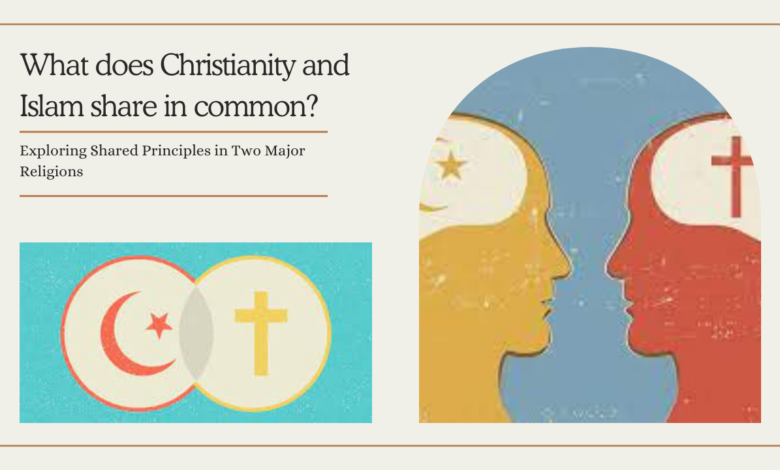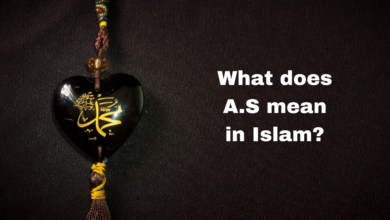What does Christianity and Islam share in common?
Exploring Shared Principles in Two Major Religions

What does Christianity and Islam share in common?
Christianity: Christianity is a monotheistic Abrahamic religion based on the teachings of Jesus Christ. It is one of the world’s largest religions, with a focus on faith in Jesus as the Son of God and Savior.
Islam: Islam is also a monotheistic Abrahamic religion founded on the teachings of the Prophet Muhammad. It emphasizes submission to the will of Allah (God) and following the teachings of the Quran.

Introduction
Christianity and Islam are two of the world’s major religions, with billions of followers combined. While they have significant theological and historical differences, they also share several commonalities that are worth exploring. Understanding these shared values can promote interfaith dialogue, cooperation, and greater understanding between Christians and Muslims. In this article, we will delve into the key commonalities between these two religions.
Monotheism
Both Christianity and Islam are monotheistic religions, meaning they believe in the existence of only one God. Christians refer to God as the Holy Trinity, consisting of God the Father, God the Son (Jesus Christ), and God the Holy Spirit. In contrast, Muslims believe in the absolute oneness of Allah. Despite the different theological understandings of God’s nature, the core belief in the existence of one God is a fundamental similarity.
Prophets and Messengers
Both religions recognize the importance of prophets and messengers as intermediaries between God and humanity. In Christianity, Jesus Christ is considered the central figure, believed to be the Son of God and the Messiah. In Islam, Prophet Muhammad is the final and most prominent messenger, who received the Quran as divine revelation. However, both religions acknowledge the significance of other prophets, such as Adam, Noah, Abraham, and Moses, though their roles and importance may differ between the two faiths.
Sacred Scriptures
Christianity and Islam each have their holy scriptures that serve as guides for their respective faiths. Christians follow the Bible, which consists of the Old Testament and the New Testament. The Old Testament contains teachings and stories from the Hebrew Bible, while the New Testament contains the teachings and life of Jesus Christ.
Muslims follow the Quran, which they believe to be the literal word of God as revealed to Prophet Muhammad. Additionally, both religions value various secondary texts, such as the Hadiths in Islam and the writings of early Christian theologians in Christianity, as sources of guidance and interpretation.
Also Check
- Is weed haram in Islam?
- Is Music Forbidden In Islam?
- Charity As Taught By Quran And Prophet Muhammad (PBUH)
- Who were the grandsons of Prophet Muhammad?
- Who is Abraham in Islam?
- What is the Islam Bible called?
- What conditions were laid between the Muslims and the infidels on the occasion of peace at Hudaybiyah?
Moral and Ethical Values
Both Christianity and Islam emphasize moral and ethical principles that guide the behavior of their followers. These values include compassion, charity, honesty, humility, forgiveness, and the importance of helping others in need. Both religions teach that individuals should strive to live virtuous lives, treating others with kindness and respect.
Prayer and Worship
Prayer and worship are central aspects of both Christianity and Islam. Christians typically gather in churches for communal worship and engage in various forms of prayer, including the Lord’s Prayer. Muslims pray five times a day, facing the Kaaba in Mecca, as an essential part of their daily routine. In both faiths, prayer is seen as a means of connecting with God, seeking guidance, and expressing gratitude.
Belief in the Afterlife
Both religions share beliefs about the afterlife, including concepts of heaven and hell. Christians generally believe in heaven as a place of eternal happiness and closeness to God, while hell represents eternal separation from God. In Islam, heaven (Jannah) and hell (Jahannam) also play significant roles in the faith, with the ultimate destination being determined by one’s deeds and faith.
Conclusion
While Christianity and Islam have notable theological differences, they also share several commonalities that promote understanding and cooperation among their followers. The belief in one God, recognition of prophets and messengers, sacred scriptures, moral values, prayer, and the concept of the afterlife are all areas where these two major world religions find common ground. Recognizing these shared values can serve as a foundation for dialogue and collaboration, fostering greater interfaith harmony and understanding in an increasingly diverse and interconnected world.

FAQs: What Does Christianity and Islam Share in Common?
What are Christianity and Islam?
Christianity: Christianity is a monotheistic Abrahamic religion based on the teachings of Jesus Christ. It is one of the world’s largest religions, with a focus on faith in Jesus as the Son of God and Savior.
Islam: Islam is also a monotheistic Abrahamic religion founded on the teachings of the Prophet Muhammad. It emphasizes submission to the will of Allah (God) and following the teachings of the Quran.
Do Christianity and Islam believe in the same God?
Yes, both Christianity and Islam believe in one God, whom they refer to as God (in Christianity) or Allah (in Islam). They both worship the same monotheistic deity of Abrahamic tradition.
Are there common religious texts between Christianity and Islam?
While they have different primary scriptures, both religions share some common stories and figures from the Hebrew Bible (Old Testament), such as Adam, Noah, Abraham, and Moses.
Do Christianity and Islam have common religious figures?
Yes, they both recognize some common figures like Abraham (Ibrahim in Islam) as a revered prophet. However, their roles and significance may differ in the two religions.
What are the similarities in ethical teachings?
Both Christianity and Islam emphasize ethical principles such as compassion, honesty, generosity, and justice. Both religions teach their followers to be kind and just in their dealings with others.
Do they have any similar religious practices?
Both religions incorporate prayer into their daily lives. Christians pray in churches, while Muslims pray in mosques. Additionally, fasting is a common practice in both faiths during Lent (Christianity) and Ramadan (Islam).
Is there a concept of charity in both religions?
Yes, both Christianity and Islam promote the idea of charity and helping those in need. In Christianity, this is often referred to as “charity” or “almsgiving,” while in Islam, it’s known as “Zakat.”
Do they share any common religious holidays?
While the specific holidays may differ, both religions celebrate significant events in the lives of their respective prophets. For example, Christmas in Christianity celebrates the birth of Jesus, and Eid al-Fitr in Islam marks the end of Ramadan.
Are there any theological differences?
Yes, there are significant theological differences between Christianity and Islam, including their beliefs about the nature of God, the Trinity (Christianity), and the prophethood of Muhammad (Islam).
Can followers of these religions engage in interfaith dialogue and cooperation?
Yes, many Christians and Muslims engage in interfaith dialogue and cooperation to foster understanding, tolerance, and collaboration on shared humanitarian issues.






